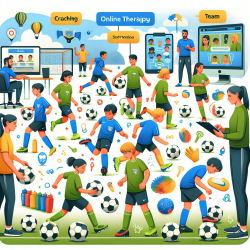Introduction
In the digital age, video games have become a ubiquitous part of children's lives. This is especially true for children diagnosed with Attention Deficit Hyperactivity Disorder (ADHD). The study titled "Video Games in ADHD and Non-ADHD Children: Modalities of Use and Association With ADHD Symptoms" provides valuable insights into how video games impact children with ADHD. As practitioners, understanding these dynamics is crucial for developing effective intervention strategies.
Key Findings from the Study
The study, conducted by Masi et al., involved 280 children aged 4-12 years, divided into three groups: ADHD, Clinical-Control, and Community-Control. The research highlighted several critical points:
- Increased Playtime: Children with ADHD spent significantly more time playing video games compared to their non-ADHD peers, both during weekdays and weekends.
- Higher Addiction Scores: The ADHD group exhibited higher addiction scores, indicating a greater propensity for developing addictive behaviors related to video gaming.
- Correlation with ADHD Symptoms: There was a significant correlation between the severity of ADHD symptoms and video game addiction, particularly with impulsivity.
- Gender Differences: Boys with ADHD were more prone to video game addiction than girls, emphasizing the need for gender-specific interventions.
Implications for Practitioners
These findings have several implications for practitioners working with children with ADHD:
- Monitoring and Regulation: Practitioners should encourage parents to monitor and regulate their children's video game usage, especially for those with ADHD.
- Gender-Specific Strategies: Given the gender differences observed, interventions may need to be tailored specifically for boys and girls.
- Focus on Impulsivity: Since impulsivity is strongly correlated with video game addiction, interventions targeting impulse control may be beneficial.
- Parental Involvement: Educating parents about the potential risks of excessive gaming and involving them in setting boundaries can be crucial.
Encouraging Further Research
While this study provides valuable insights, it also opens avenues for further research. Future studies could explore the long-term effects of video game addiction on ADHD symptoms and investigate the efficacy of various intervention strategies. Additionally, understanding the role of different types of video games and their specific impacts could help refine therapeutic approaches.
Conclusion
The relationship between video games and ADHD symptoms is complex and multifaceted. As practitioners, leveraging data-driven insights from research like this can enhance our understanding and improve outcomes for children with ADHD. By integrating these findings into practice, we can better support children in navigating the digital landscape while managing their ADHD symptoms effectively.
To read the original research paper, please follow this link: Video Games in ADHD and Non-ADHD Children: Modalities of Use and Association With ADHD Symptoms.










